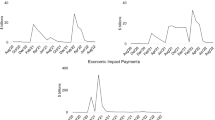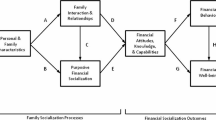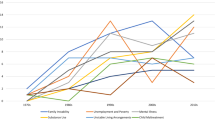Abstract
In early 2021, Congress expanded the existing Child Tax Credit (CTC), increasing the credit’s maximum value (up to $3000 for school-age children and $3600 for children under the age of six). Half of the credit was issued monthly to most families from July to December 2021. The temporary expansion was further made fully refundable, meaning that for one year, even very low-income families qualified. In this study, we draw on a novel, multi-wave probability-based panel survey of more than 1000 CTC recipients to understand the credit’s impact on families. Using a mixed-methods approach that combines logistic regression and qualitative content analysis, we find that most respondents reported that the CTC made it easier for them to support their families, afford utility bills, and cover housing costs. Over one-third of respondents also stated that the CTC allowed them to pay for extracurricular activities for their children and save for their child’s future education, and spend more time with their children. In open-ended responses, parents describe that the CTC had a generally positive effect: it helped with bills/utilities, allowed families to save, helped with groceries/food, covered necessities for children, and reduced stress for parents. Conversely, some reported that it had no effects or made no difference. We also assess how participant demographics and political affiliation are associated with each theme.

Similar content being viewed by others
Data availability
The data that support the findings of this study are available from NORC/AmeriSpeak, but restrictions apply to the availability of these data, which were used under license for the current study, and so are not publicly available. Data are, however, available from the authors upon reasonable request and with permission of NORC/AmeriSpeak.
References
Acs G, Werner K (2021) How a permanent expansion of the child tax credit could affect poverty. Urban Institute, p 21. https://www.urban.org/sites/default/files/publication/104626/how-a-permanent-expansion-of-the-child-tax-credit-could-affect-poverty_0.pdf
Bastian J (2020) The rise of working mothers and the 1975 earned income tax credit. Am Econ J Econ Policy 12(3):44–75. https://doi.org/10.1257/pol.20180039
Bastian J (2022) Investigating the effects of the 2021 child tax credit expansion on poverty and maternal employment. Rutger University. https://drive.google.com/file/d/1H5iNZZO_YFRIDz-3Tip4C-BpnD85bUjH/view?usp=embed_facebook
Bellisle D, Andrade F, Kramer K, Mendenhall R, Greenlee AJ (2021) Lessons from the Chicago EITC periodic payment pilot and implications for Illinois. Project for middle class renewal - University of Illinois at Urbana-Champaign, p 30. http://publish.illinois.edu/projectformiddleclassrenewal/files/2021/09/Bellisle_Benefits-of-Recurring-Tax-Credit-Payments_2021.pdf
Bellisle D (2021) The role of the earned income tax credit in family economic decision making: moving beyond an individual actor model. The University of Chicago. https://doi.org/10.6082/uchicago.3424
Burnside A (2021) Key findings from national child tax credit survey CTC monthly payments are hel** improve family well-being (November). The Center for Law and Social Policy, Washington DC. https://www.clasp.org/publications/report/brief/key-findings-national-child-tax-credit-survey-ctc-monthly-payments-are
Center on Poverty and Social Policy (2021a) Expanded child tax credit continues to keep millions of children from poverty in September. Center on Poverty and Social Policy. https://www.povertycenter.columbia.edu/news-internal/monthly-poverty-september-2021
Center on Poverty and Social Policy (2021b) November child tax credit payment kept 3.8 million children from poverty. Center on Poverty and Social Policy. https://www.povertycenter.columbia.edu/news-internal/monthly-poverty-november-2021
Center on Poverty and Social Policy (2021c) October child tax credit payment kept 3.6 million children from poverty. Center on Poverty and Social Policy. https://www.povertycenter.columbia.edu/news-internal/monthly-poverty-october-2021
Cohen S, Underwood LG, Gottlieb BH (2000) Social support measurement and intervention: a guide for health and social scientists. Oxford University Press
Collyer S, Curran MA, Garfinkel I, Harris D, Stabile M, Waldfogel J, Wimer C (2020) What a child allowance like Canada’s would do for child poverty in America. The Century Foundation, p 20. https://tcf.org/content/report/what-a-child-allowance-like-canadas-would-do-for-child-poverty-in-america/?agreed=1
Corinth K, Meyer B, Stadnicki M, Wu D (2021) The anti-poverty, targeting, and labor supply effects of the proposed child tax credit expansion (SSRN Scholarly Paper ID 3938983). Social Science Research Network. https://doi.org/10.2139/ssrn.3938983
Crandall-Hollick ML (2014) The child tax credit: current law and legislative history. Congressional Research Service, p 27. https://www.everycrsreport.com/files/20140728_R41873_10c80e8ee4d3eb9e090882af93cfba4d3985bf16.pdf
Crandall-Hollick ML (2018) The child tax credit: legislative history. Congressional Research Service, p 15. https://govbudget.com/wp-content/uploads/2018/12/The-Child-Tax-Credit_-Legislative-History.pdf
Crandall-Hollick ML (2020) The child tax credit (In Focus). Congressional Research Service, p 3. https://crsreports.congress.gov/product/pdf/IF/IF11077
Crandall-Hollick ML (2021) The child tax credit: legislative history No. R45124. Congressional Research Service. https://sgp.fas.org/crs/misc/R45124.pdf
Curran MA (2021) The efficacy of cash supports for children by race and family size: understanding disparities and opportunities for equity. Race Soc Problems. https://doi.org/10.1007/s12552-021-09315-6
Danielson C, Thorman T (2021) Tax hurdles may limit impact of the expanded child tax credit. Public Policy Institute of California. https://www.ppic.org/blog/tax-hurdles-may-limit-impact-of-the-expanded-child-tax-credit/
Data for Progress (2021) Permanent child tax credit expansion. https://www.filesforprogress.org/datasets/2021/5/dfp-permanent-child-tax-credit-expansion-TOPS.pdf
Eissa N, Hoynes HW (2004) Taxes and the labor market participation of married couples: the earned income tax credit. J Public Econ 88(9):1931–1958. https://doi.org/10.1016/j.jpubeco.2003.09.005
Ellwood DT (2000) The impact of the earned income tax credit and social policy reforms on work, marriage, and living arrangements. Natl Tax J 4:1063
Fisher J, Rehkopf DH (2022) The earned income tax credit as supplementary food benefits and savings for durable goods. Contemp Econ Policy. https://doi.org/10.1111/coep.12565
Goldin J, Maag E, Michelmore K (2021) Estimating the net fiscal cost of a child tax credit expansion. In: Tax policy and the economy, vol 36. University of Chicago Press. https://www.nber.org/books-and-chapters/tax-policy-and-economy-volume-36/estimating-net-fiscal-cost-child-tax-credit-expansion
Halpern-Meekin S, Sykes J, Tach L, Edin K (2014) It’s not like I’m poor: how working families make ends meet in a post-welfare world. University of California Press
Hamilton L, Roll S, Despard M, Maag E, Chun Y (2021) Employment, financial and well-being effects of the 2021 expanded child tax credit. Social Policy Institute of Washington University, St. Louis, p 25. https://socialpolicyinstitute.wustl.edu/employment-financial-wellbeing-effects-2021-ctc-report/
Hamilton L, Mulvale JP (2019) “Human again”: the (unrealized) promise of basic income in Ontario. J Poverty 23(7):576–599. https://doi.org/10.1080/10875549.2019.1616242
Herbst CM (2010) The labor supply effects of child care costs and wages in the presence of subsidies and the earned income tax credit. Rev Econ Househ 8(2):199–230. https://doi.org/10.1007/s11150-009-9078-1
Hsieh H-F, Shannon SE (2005) Three approaches to qualitative content analysis. Qual Health Res 15(9):1277–1288. https://doi.org/10.1177/1049732305276687
Internal Revenue Service (2021a) Child tax credit: most eligible families will automatically receive monthly payments. For everyone else, here are three steps to get help. Internal Revenue Service. https://www.irs.gov/newsroom/child-tax-credit-most-eligible-families-will-automatically-receive-monthly-payments-for-everyone-else-here-are-three-steps-to-get-help
Internal Revenue Service (2021b) IRS, Treasury announce families of 88 percent of children in the U.S. to automatically receive monthly payment of refundable child tax credit. Internal Revenue Service. https://www.irs.gov/newsroom/irs-treasury-announce-families-of-88-percent-of-children-in-the-us-to-automatically-receive-monthly-payment-of-refundable-child-tax-credit
Internal Revenue Service (2021c) IRS statement – advance child tax credit payments. Internal Revenue Service. https://www.irs.gov/newsroom/irs-statement-advance-child-tax-credit-payments
Jones LE, Milligan K, Stabile M (2019) Child cash benefits and family expenditures: evidence from the National Child Benefit. Canad J Econ/Revue Canadienne D’économique 52(4):1433–1463. https://doi.org/10.1111/caje.12409
Karpman M, Maag E, Kenney G, Wissoker D (2021) Who has received advance child tax credit payments, and how were the payments used? Urban Institute. https://www.urban.org/research/publication/who-has-received-advance-child-tax-credit-payments-and-how-were-payments-used
López-Santana M, Núñez L (2021) Most Americans support Biden’s expanded child tax credit, our research finds. But there are caveats. The Washington Post. https://www.washingtonpost.com/politics/2021/11/10/most-americans-support-bidens-expanded-child-tax-credit-our-research-finds-there-are-caveats/
Maag E, Peters HE, Edelstein S (2016) Increasing family complexity and volatility: the difficulty in determining child tax benefits. Urban Institute. https://www.urban.org/research/publication/increasing-family-complexity-and-volatility-difficulty-determining-child-tax-benefits
Marr C, Cox K, Sherman A (2021a) Recovery package should permanently include families with low incomes in full child tax credit. Center on Budget and Policy Priorities, Washington, DC. https://www.cbpp.org/research/federal-tax/recovery-package-should-permanently-include-families-with-low-incomes-in-full
Marr C, Cox K, Hingtgen S, Windham K, Sherman A (2021b) American rescue plan act includes critical expansions of child tax credit and EITC. Center on Budget and Policy Priorities. https://www.cbpp.org/research/federal-tax/american-rescue-plan-act-includes-critical-expansions-of-child-tax-credit-and
Mendenhall R, Edin K, Crowley S, Sykes J, Tach L, Kriz K, Kling JR (2012) The role of earned income tax credit in the budgets of low-income households. Social Serv Rev 86(3):367–400
Mendenhall R, Kramer KZ, Bellisle D (2018) Low- and moderate-income families’ avenues to mobility: overcoming threats to asset accumulation and remaining in undesirable neighborhoods. Res Soc Stratif Mobil 53:26–39. https://doi.org/10.1016/j.rssm.2017.12.001
Michelmore K, Jones L (2015) Timing is money: does lump-sum payment of tax credits induce high-cost borrowing? Proc Annu Conf Taxat 108:1–41
Michelmore K, Pilkauskas N (2021) Tots and teens: how does child’s age influence maternal labor supply and child care response to the earned income tax credit? J Labor Econ 39(4):895–929. https://doi.org/10.1086/711383
McGranahan L, Schanzenbach DW (2013) The earned income tax credit and food consumption patterns. FRB of Chicago Working Paper No 2-13-14.
Nichols A, Rothstein J (2015) The earned income tax credit (EITC). Working Paper No. 21211. National Bureau of Economic Research. https://doi.org/10.3386/w21211
NORC (2021) Technical overview of the AmeriSpeak panel. University of Chicago. https://amerispeak.norc.org/content/dam/amerispeak/research/pdf/AmeriSpeak%20Technical%20Overview%202019%2002%2018.pdf
Parolin Z, Collyer S, Curran MA (2021a) Sixth child tax credit payment kept 3.7 million children out of poverty in December. Child poverty set to spike in January 2022 after expiration of monthly payments. Center on Poverty and Social Policy, p 6. https://www.povertycenter.columbia.edu/news-internal/monthly-poverty-december-2021
Parolin Z, Collyer S, Curran MA, Wimer C (2021b) Monthly poverty rates among children after the expansion of the child tax credit. Center on Poverty and Social Policy, p 14. https://www.povertycenter.columbia.edu/news-internal/monthly-poverty-july-2021
Parolin Z, Collyer S, Curran MA, Wimer C (2021c) The potential poverty reduction effect of the American Rescue Plan. Center on Poverty and Social Policy
Parolin Z, Curran MA (2021) Expanded child tax credit leads to further decline in child poverty in August 202. Center on Poverty and Social Policy, p 3. https://www.povertycenter.columbia.edu/news-internal/monthly-poverty-august-2021
Perez-Lopez DJ (2021) Economic hardship declined in households with children as child tax credit payments arrived: household pulse survey collected responses just before and just after the arrival of the first CTC checks. US Census Bureau, Washington DC. https://www.census.gov/library/stories/2021/08/economic-hardship-declined-in-households-with-children-as-child-tax-credit-payments-arrived.html
Pilkauskas N, Michelmore K (2021) Families with low incomes and the child tax credit: who is still missing out. Poverty Solutions, p 9. http://sites.fordschool.umich.edu/poverty2021/files/2021/12/PovertySolutions-Child-Tax-Credit-who-is-still-missing-out-Decembe2021.pdf
Propel (2021) The child tax credit is bringing “a sense of security and relief” to parents. https://www.joinpropel.com/ctc-in-depth-october
Rachidi A (2021) New survey data raises questions about the expanded child tax credit. American Enterprise Institute, Washington DC. https://www.aei.org/poverty-studies/new-survey-data-raises-questions-about-the-expanded-child-tax-credit
Raschke C (2016) The impact of the German child benefit on household expenditures and consumption. Ger Econ Rev 17(4):438–477. https://doi.org/10.1111/geer.12079
Roll S, Hamilton L, Chun Y (2022) Expanded child tax credit payments have not reduced employment. Social Policy Institute of Washington University in St. Louis. https://cpb-us-w2.wpmucdn.com/sites.wustl.edu/dist/a/2003/files/2021/12/CTC-andEmployment-01262022.pdf
Roll S, Chun Y, Brugger L, Hamilton L (2021) How are American families using their child tax credit payments? Evidence from census data Social Policy Institute. Washington University in St. Louis & Appalachian State University. https://cpb-us-w2.wpmucdn.com/sites.wustl.edu/dist/a/2003/files/2021/09/CTC-National-Analysis.pdf
Romney M, Burr R, Daines S (2022) Family Security Act 2.0. https://www.romney.senate.gov/wp-content/uploads/2022/06/updated_family-security-act-2.0_one-pager_appendix.pdf
Shaefer HL, Collyer S, Duncan G, Edin K, Garfinkel I, Harris D, Smeeding TM, Waldfogel J, Wimer C, Yoshikawa H (2018) A universal child allowance: a plan to reduce poverty and income instability among children in the United States. RSF: The Russell Sage Foundation. J Soc Sci 4(2):22–42. https://doi.org/10.7758/RSF.2018.4.2.02
Sherman A, DeBot B, Huang C-C (2016) Child poverty interventions in the US: boosting low-income children’s opportunities to succeed through direct income support. Acad Pediatr 16(Supplement):S90–S97. https://doi.org/10.1016/j.acap.2016.01.008
Smeeding TM, Phillips KR, O’Connor M (2000) The EITC: expectation, knowledge, use, and economic and social mobility. Natl Tax J 53(4):1187–1209
Sykes J, Križ K, Edin K, Halpern-Meekin S (2015) Dignity and dreams: what the earned income tax credit (EITC) means to low-income families. Am Sociological Rev 80(2):243–267. https://doi.org/10.1177/0003122414551552
Tach L, Halpern-Meekin S (2014) Tax code knowledge and behavioral responses among EITC recipients: policy insights from qualitative data. J Policy Anal Manage 33(2):413–439. https://doi.org/10.1002/pam.21739
Tach L, Halpern-Meekin S, Edin K, Amorim M (2019) “As good as money in the bank”: building a personal safety net with the earned income tax credit. Soc Prob 66(2):274–293. https://doi.org/10.1093/socpro/spy001
Taylor J (2021, March 16) Child tax credit 2021: who gets $3600? Will I get monthly payments? And other FAQs. Kiplinger. https://www.kiplinger.com/taxes/602431/child-tax-credit-2021-who-gets-3600-will-i-get-monthly-payments-and-other-faqs
Thoits PA (2011) Perceived social support and the voluntary, mixed, or pressured use of mental health services. Soc Ment Health 1(1):4–19. https://doi.org/10.1177/2156869310392793
U.S. Department of the Treasury (2023) Child tax credit. U.S. Department of the Treasury. https://home.treasury.gov/policy-issues/coronavirus/assistance-for-american-families-and-workers/child-tax-credit. Accessed 16 June 2022
U.S. Department of the Treasury (2021) Treasury and IRS disburse sixth monthly child tax credit to families of 61 million children. U.S. Department of the Treasury. https://home.treasury.gov/news/press-releases/jy0533
Waxman E, Gupta P, Gonzalez D (2021) Initial parent perspectives on the child tax credit advance payments. Urban Institute, p 14. https://www.urban.org/sites/default/files/publication/104863/initial-parent-perspectives-on-the-child-tax-credit-advance-payments.pdf
Wessel D (2021) What is the child tax credit? And how much of it is refundable? Brookings https://www.brookings.edu/blog/up-front/2021/01/22/what-is-the-child-tax-credit-and-how-much-of-it-is-refundable/
Williams C (2021) Biden’s child tax credit gets support from over half of voters. A similar share says it should expire. Morning Consult. https://morningconsult.com/2021/07/21/child-tax-credit-payments-biden-poll/
West S, Baker A, Samra S, Coltrera E (2021) Preliminary analysis: SEED’s first year. Stockton Economic Empowerment Demonstration, p 25. https://static1.squarespace.com/static/6039d612b17d055cac14070f/t/603ef1194c474b329f33c329/1614737690661/SEED_Preliminary%B1Analysis-SEEDs%B1First%B1Year_Final%B1Report_Individual%B1Pages%B1-2.pdf
Wilson M (2021) NEW POLL: a majority of voters support permanently expanding child tax credit as awareness for the tax cut grows. Fighting Chance for Families. https://www.fightingchanceforfamilies.org/press-releases/new-poll-a-majority-of-voters-support-permanently-expanding-child-tax-credit-as-awareness-for-the-tax-cut-grows
Wilson R (2020) The EITC and employment transitions: labor force attachment and annual exit. Natl Tax J 73(1):11–46. https://doi.org/10.17310/ntj.2020.1.01
Yin RK (2015) Qualitative research from start to finish, 2nd edn. The Guilford Press
Zelizer VA (1994) The creation of domestic currencies. Am Econ Rev 84(2):138–142
Zelizer VA (2017) The social meaning of money: pin money, paychecks, poor relief, and other currencies. Princeton University Press
Zippel C (2021) 9 in 10 families with low incomes are using child tax credits to pay for necessities, education. Center on Budget and Policy Priorities, Washington DC. http://www.cbpp.org/blog/9-in-10-families-with-low-incomes-are-using-child-tax-credits-to-pay-for-necessities-education. Accessed Dec 2021
Zucker G (2021) Opportunities and limitations of using data to reach non-filers with the CTC. New America Foundation. http://newamerica.org/new-practice-lab/blog/data-and-non-filers/
Acknowledgements
The authors wish to acknowledge the generous support of the funder, Humanity Forward.
Funding
This research was generously supported by Humanity Forward. The authors have no financial or proprietary interests in any material discussed in this article.
Author information
Authors and Affiliations
Contributions
Author #1 was the Co-Principal Investigator of the study, secured funding, co-designed the study, and led the write-up of the paper. Author #2 contributed significantly to the writing. Author #3 conducted data analysis and wrote up the methods and findings. Author #4, as Co-Principal Investigator, co-designed the study and led the data analysis. Author #5 supported the write-up of the study. Author #6 assisted with data analysis.
Corresponding author
Ethics declarations
Ethical approval
This research was approved by the Washington University in St. Louis Institutional Review Board (IRB# 202106154). The study met the criteria for approval per 45 CFR 46.111 and/or 21 CFR 56.111, as applicable.
Informed consent
Informed consent was obtained from all participants in this study.
Conflict of interest
The authors declare that they have no financial or non-financial interests that could have appeared to influence the work reported in this paper.
Additional information
This research was generously supported by Humanity Forward. Inquiries can be submitted to the primary author at hamiltonl@appstate.edu.
Rights and permissions
Springer Nature or its licensor (e.g. a society or other partner) holds exclusive rights to this article under a publishing agreement with the author(s) or other rightsholder(s); author self-archiving of the accepted manuscript version of this article is solely governed by the terms of such publishing agreement and applicable law.
About this article
Cite this article
Hamilton, L., Bellisle, D., Brugger, L. et al. “It saved us”: parent perspectives of the 2021 expanded child tax credit. SN Soc Sci 4, 26 (2024). https://doi.org/10.1007/s43545-023-00827-z
Received:
Accepted:
Published:
DOI: https://doi.org/10.1007/s43545-023-00827-z




